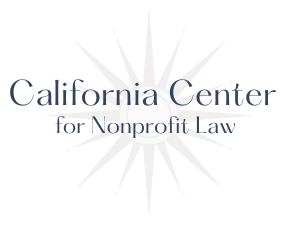
California Solicitation Registration Requirements for 501(c)(3) Charities
Many states, including California, have solicitation registration requirements that regulate charities that seek to solicit donations in the state. Charities can include various types of organizations but always include charitable entities that receive federal tax exemption under Internal Revenue Code (IRC) 501(c)(3). These laws vary from one state to the next but typically require some form of registration with a state agency and often include periodic reporting requirements. Furthermore, cities and counties may have specific solicitation registration requirements in addition to state requirements. Your charity typically must follow these requirements before making any efforts to fundraise or solicit donations within the state.
Therefore, if your charity intends to solicit donations or conduct fundraising efforts in California, you must know state and local registration and reporting requirements. The California Center for Nonprofit Law can help you understand these requirements and ensure that your charity always remains compliant.
California Charitable Organization Solicitation Registration Requirements
California’s Attorney General maintains a Registry of Charities and Fundraisers (Registry) to regulate charities, other nonprofit organizations, fundraising professionals, and charitable fundraising platforms. As part of its Registry, the Attorney General oversees the registration and reporting requirements in the Supervision of Trustees and Fundraisers for Charitable Purposes Act (Gov. Code, § 12580 et seq.) and its regulations.
Under Gov. Code §12585, charitable organizations must register with the Attorney General Registry within 30 days of first receiving property. The definition of property includes cash donations, property donations, and other assets with financial value that the organization receives for charitable purposes.
The charitable organization must complete Form CT-1 and pay a $50 initial registration fee. Along with Form CT-1, the charitable organization must submit the following:
- A copy of the organization’s tax exemption application IRS Form 1023 or Form 1023-EZ (if submitted to the IRS);
- A copy of the organization’s IRS determination letter (if received from the IRS); and
- Copies of the organization’s founding documents, which requirements vary according to the type of charity involved:
- Corporations
- Endorsed articles of incorporation stamped with the corporate number assigned by the SOS (including all endorsed amendments); and
- Current bylaws
- Associations
- Instrument creating the organization (bylaws, constitution, and/or articles of association)
- Trusts
- Trust instrument; or
- Will and decree of final distribution.
- Corporations
Charitable organizations that operate primarily as hospitals, educational institutions, or religious organizations are exempt from the registration and reporting requirements.
California Annual Solicitation Registration Renewal Requirements
In addition to initial solicitation registration requirements, charitable organizations must annually renew their registration in California. Charities comply with this requirement by filing Form RRF-1, Annual Registration Renewal Fee Report. Charities must file Form RRF-1 within four months and fifteen days after the organization’s fiscal or calendar year ends. However, if the charity obtains an extension from the IRS to file its annual IRS Form 990, 990-EZ, or 990-PF, the Registry will honor that extension.
The filing fee for Form RRF-1 varies according to the organization’s gross annual revenue for the year before. Along with Form RRF-1, charities must file a copy of their annual IRS Form 990, Form 990-EZ, or Form 990-PF informational return, along with all attached schedules, except for Schedule B. If a charitable organization’s total revenue for the previous fiscal year is less than $50,000, the organization also must file Form CT-TR-1.
Additionally, California law requires that charities with gross revenue of $2,000,000 or more, excluding government grants and contracts for services, have audited financial statements and, for corporations, an audit committee. While charities subject to these requirements need not file the audited financial statements with the Registry, they must keep the statements available for inspection by the Attorney General and the public, if requested.
Failure to follow the annual solicitation registration renewal requirements will result in the Registry listing the charity as delinquent. The Attorney General can assess $25 late fees each month, and continued delinquency can result in permanent suspension. Charities must be in good standing with the Registry to continue to solicit donations or fundraise in California.
Soliciting Donations or Fundraising in Other States
California charities that wish to solicit donations or fundraise in other states must meet those states’ registration, renewal registration, and reporting requirements. Failure to comply with these state and, in some cases, local laws can result in financial penalties, revocation of tax-exempt status at the state level, an inability to fundraise or solicit donations in that state, and administration or legal action.
Call the California Center for Nonprofit Law Today
The laws that govern charitable organizations are complex and ever-changing. We aim to inform you of legal changes that affect your charitable organization. If you need legal advice or assistance, we are here to help. Contact an experienced nonprofit lawyer today. Call the California Center for Nonprofit Law offices at (949) 892-1221, email us at info@NPOlawyers.com, or contact us online for more information today. We offer a wealth of experience handling the unique legal issues that charitable organizations routinely face.
